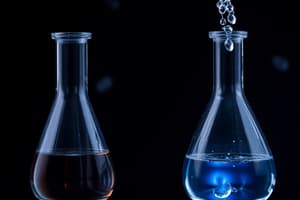Podcast
Questions and Answers
What is a physical property?
What is a physical property?
A property that can be observed and measured without changing the identity of the substance.
What is the melting point?
What is the melting point?
The temperature and pressure at which a substance changes from a solid to a liquid.
What is the boiling point?
What is the boiling point?
The temperature and pressure at which a substance changes from a liquid to a gas.
What does density represent?
What does density represent?
Color is a significant identifier of a substance by itself.
Color is a significant identifier of a substance by itself.
What is a chemical property?
What is a chemical property?
What is flammability?
What is flammability?
What is the ability to rust?
What is the ability to rust?
Which of the following are examples of physical properties of matter? (Select all that apply)
Which of the following are examples of physical properties of matter? (Select all that apply)
Which of the following are examples of chemical properties of matter? (Select all that apply)
Which of the following are examples of chemical properties of matter? (Select all that apply)
What is conductivity?
What is conductivity?
What is ductility?
What is ductility?
What is malleability?
What is malleability?
What does texture refer to?
What does texture refer to?
A change in odor indicates a chemical change.
A change in odor indicates a chemical change.
What is magnetism?
What is magnetism?
What is solubility?
What is solubility?
What is reactivity?
What is reactivity?
How is density calculated?
How is density calculated?
What are signs of chemical change? (Select all that apply)
What are signs of chemical change? (Select all that apply)
What is a precipitate?
What is a precipitate?
What does the state of matter describe?
What does the state of matter describe?
What is thermal conductivity?
What is thermal conductivity?
What is electrical conductivity?
What is electrical conductivity?
What is luster?
What is luster?
Flashcards are hidden until you start studying
Study Notes
Properties of Matter
- Physical Property: An observable and measurable attribute of a substance without altering its identity.
- Melting Point: The specific temperature and pressure at which a solid becomes a liquid.
- Boiling Point: The specific temperature and pressure where a liquid transitions into a gas.
- Density: Defined as the mass of a substance divided by its volume, represented by the formula D = m/v.
- Color: Can indicate a chemical change but is not a reliable identifier on its own.
Chemical Properties
- Chemical Property: Observed when substances react with others, resulting in the formation of new substances.
- Flammability: A chemical property indicating the ability of a substance to combust rapidly in the presence of oxygen.
- Rusting: A slow chemical reaction, particularly involving iron, with oxygen leading to corrosion.
- Reactivity: Refers to how readily a substance combines chemically with others.
Examples of Properties
- Physical Properties of Matter: Include melting point, boiling point, density, color, conductivity, ductility, and malleability.
- Chemical Properties of Matter: Include the ability to burn, rust, and reactivity with other substances.
Additional Physical Properties
- Conductivity: The capacity of a substance to conduct heat or electricity.
- Ductility: The ability to be drawn into wires.
- Malleability: The ability to be shaped or flattened without breaking.
- Texture: Describes the feel of a substance's surface.
- Odor: A change in odor can signal a chemical change.
- Magnetism: The attraction a substance has to a magnetic field.
- Solubility: The ease with which a substance dissolves in another.
Chemical Change Indicators
- Signs of Chemical Change: Include color changes, odor changes, gas production, and heat generation.
- Precipitate: A solid product formed during a chemical reaction involving two liquids.
States of Matter
- State of Matter: Describes matter in its solid, liquid, or gas forms.
Thermal and Electrical Conductivity
- Thermal Conductivity: The ability of a substance to transfer heat to another material.
- Electrical Conductivity: The capability of a substance to conduct electricity; commonly high in metals.
Luster
- Luster: A physical property describing whether a substance appears shiny or dull, with metals typically exhibiting a shiny appearance.
Studying That Suits You
Use AI to generate personalized quizzes and flashcards to suit your learning preferences.




